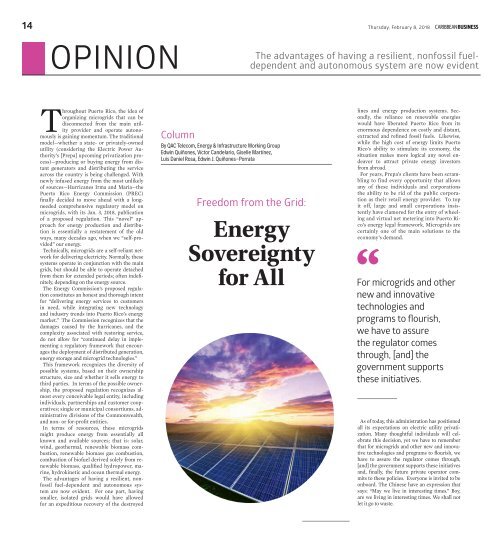Create successful ePaper yourself
Turn your PDF publications into a flip-book with our unique Google optimized e-Paper software.
14<br />
Thursday, February 8, <strong>2018</strong><br />
OPINION<br />
The advantages of having a resilient, nonfossil fueldependent<br />
and autonomous system are now evident<br />
Throughout Puerto Rico, the idea of<br />
organizing microgrids that can be<br />
disconnected from the main utility<br />
provider and operate autonomously<br />
is gaining momentum. The traditional<br />
model—whether a state- or privately-owned<br />
utility (considering the Electric Power Authority’s<br />
[Prepa] upcoming privatization process)—producing<br />
or buying energy from distant<br />
generators and distributing the service<br />
across the country is being challenged. With<br />
newly infused energy from the most unlikely<br />
of sources—Hurricanes Irma and Maria—the<br />
Puerto Rico Energy Commission (PREC)<br />
finally decided to move ahead with a longneeded<br />
comprehensive regulatory model on<br />
microgrids, with its Jan. 3, <strong>2018</strong>, publication<br />
of a proposed regulation. This “novel” approach<br />
for energy production and distribution<br />
is essentially a restatement of the old<br />
ways, many decades ago, when we “self-provided”<br />
our energy.<br />
Technically, microgrids are a self-reliant network<br />
for delivering electricity. Normally, these<br />
systems operate in conjunction with the main<br />
grids, but should be able to operate detached<br />
from them for extended periods; often indefinitely,<br />
depending on the energy source.<br />
The Energy Commission’s proposed regulation<br />
constitutes an honest and thorough intent<br />
for “delivering energy services to customers<br />
in need, while integrating new technology<br />
and industry trends into Puerto Rico’s energy<br />
market.” The Commission recognizes that the<br />
damages caused by the hurricanes, and the<br />
complexity associated with restoring service,<br />
do not allow for “continued delay in implementing<br />
a regulatory framework that encourages<br />
the deployment of distributed generation,<br />
energy storage and microgrid technologies.”<br />
This framework recognizes the diversity of<br />
possible systems, based on their ownership<br />
structure, size and whether it sells energy to<br />
third parties. In terms of the possible ownership,<br />
the proposed regulation recognizes almost<br />
every conceivable legal entity, including<br />
individuals, partnerships and customer cooperatives;<br />
single or municipal consortiums, administrative<br />
divisions of the Commonwealth,<br />
and non- or for-profit entities.<br />
In terms of resources, these microgrids<br />
might produce energy from essentially all<br />
known and available sources; that is: solar,<br />
wind, geothermal, renewable biomass combustion,<br />
renewable biomass gas combustion,<br />
combustion of biofuel derived solely from renewable<br />
biomass, qualified hydropower, marine,<br />
hydrokinetic and ocean thermal energy.<br />
The advantages of having a resilient, nonfossil<br />
fuel-dependent and autonomous system<br />
are now evident. For one part, having<br />
smaller, isolated grids would have allowed<br />
for an expeditious recovery of the destroyed<br />
Column<br />
By QAC Telecom, Energy & Infrastructure Working Group<br />
Edwin Quiñones, Víctor Candelario, Giselle Martínez,<br />
Luis Daniel Rosa, Edwin J. Quiñones-Porrata<br />
Freedom from the Grid:<br />
Energy<br />
Sovereignty<br />
for All<br />
lines and energy production systems. Secondly,<br />
the reliance on renewable energies<br />
would have liberated Puerto Rico from its<br />
enormous dependence on costly and distant,<br />
extracted and refined fossil fuels. Likewise,<br />
while the high cost of energy limits Puerto<br />
Rico’s ability to stimulate its economy, the<br />
situation makes more logical any novel endeavor<br />
to attract private energy investors<br />
from abroad.<br />
For years, Prepa’s clients have been scrambling<br />
to find every opportunity that allows<br />
any of these individuals and corporations<br />
the ability to be rid of the public corporation<br />
as their retail energy provider. To top<br />
it off, large and small corporations insistently<br />
have clamored for the entry of wheeling<br />
and virtual net metering into Puerto Rico’s<br />
energy legal framework. Microgrids are<br />
certainly one of the main solutions to the<br />
economy’s demand.<br />
For microgrids and other<br />
new and innovative<br />
technologies and<br />
programs to flourish,<br />
we have to assure<br />
the regulator comes<br />
through, [and] the<br />
government supports<br />
these initiatives.<br />
As of today, this administration has positioned<br />
all its expectations on electric utility privatization.<br />
Many thoughtful individuals will celebrate<br />
this decision, yet we have to remember<br />
that for microgrids and other new and innovative<br />
technologies and programs to flourish, we<br />
have to assure the regulator comes through,<br />
[and] the government supports these initiatives<br />
and, finally, the future private operator commits<br />
to these policies. Everyone is invited to be<br />
onboard. The Chinese have an expression that<br />
says: “May we live in interesting times.” Boy,<br />
are we living in interesting times. We shall not<br />
let it go to waste.


